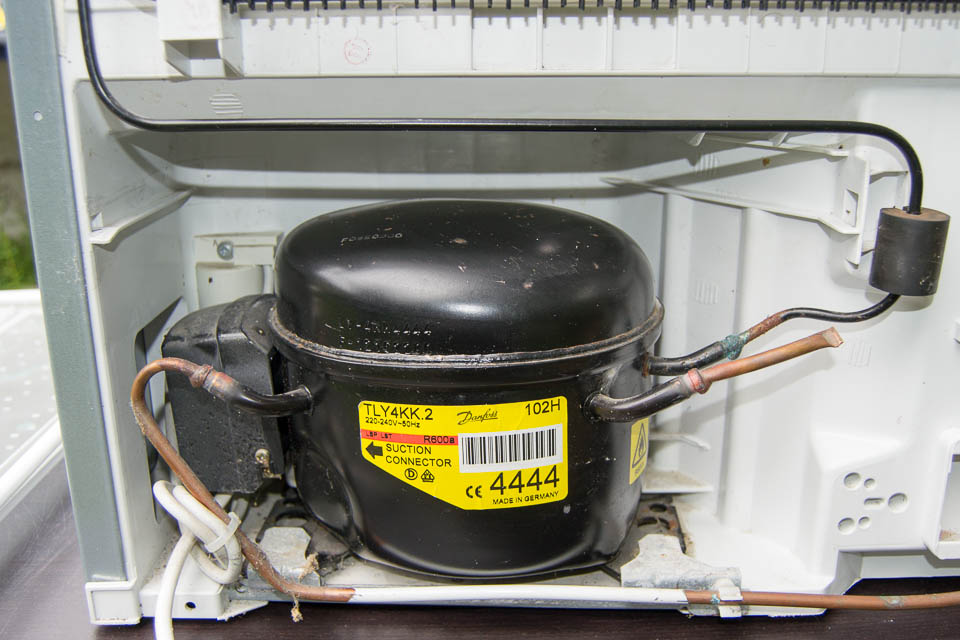A refrigerator compressor is the heart of the cooling system that keeps your food fresh and safe. It works by compressing and circulating a refrigerant that absorbs heat from the inside of the fridge and releases it outside. But how hot should a refrigerator compressor be? Is it normal for it to feel warm or even hot to the touch? And what are the signs of a problem with your refrigerator compressor?
The answer is that a refrigerator compressor should be warm, but not too hot. A normal temperature for a refrigerator compressor is less than 300 degrees Fahrenheit. If the temperature gets hotter, it can damage the compressor and waste the refrigerant. A hot compressor can also make clicking noises as it shuts off and on in self-protection. To prevent a hot compressor, it is important to keep your refrigerator clean, well-ventilated, and away from direct sunlight.
How to Check the Temperature of Your Refrigerator Compressor
If you suspect that your refrigerator compressor is too hot, you can check its temperature by following these steps:
- Unplug your refrigerator from the power outlet and wait for a few minutes until it stops running.
- Locate your refrigerator compressor, which is usually near the bottom of the back or bottom of your fridge. It looks like a black metal box with tubes and wires attached to it.
- Touch the compressor gently with your hand and feel its temperature. It should be warm, but not scalding hot. You can also use a thermometer to measure its temperature more accurately.
- Check the temperature of the discharge tube, which is the warm one that comes out of the compressor. The temperature of this tube should be less than 225 degrees Fahrenheit, about 6 inches away from the compressor.

What Causes a Refrigerator Compressor to Get Too Hot
There are several possible causes for a refrigerator compressor to get too hot, such as:
- Lack of refrigerant: If there is not enough refrigerant in the cooling system, the compressor will have to work harder and longer to cool down your fridge. This can cause it to overheat and break down. A lack of refrigerant can be caused by a leak, a faulty sensor, or improper installation.
- Dirty condenser coils: The condenser coils are the metal tubes that run along the back or bottom of your fridge. They help to release the heat from the refrigerant to the outside air. If they are dirty or dusty, they will not be able to do their job efficiently, and the heat will build up in the compressor. You should clean your condenser coils at least once a year with a vacuum cleaner or a brush.
- Broken condenser fan: The condenser fan is a small fan that blows air over the condenser coils to help them cool down. If the fan is broken or blocked, it will not be able to circulate enough air, and the compressor will overheat. You should check your condenser fan regularly and replace it if it is damaged or noisy.
- Inadequate ventilation: Your refrigerator needs enough space around it to allow proper airflow and heat dissipation. If your fridge is too close to the wall, other appliances, or direct sunlight, it will not be able to cool down properly, and the compressor will get too hot. You should leave at least 2 inches of clearance on all sides of your fridge, and avoid placing it near heat sources or windows.
- Bad compressor relay: The compressor relay is an electrical device that turns on and off the compressor according to the thermostat settings. If the relay is bad, it may cause the compressor to run continuously or intermittently, which can lead to overheating and damage. You should test the relay with a multimeter and replace it if it is faulty.

How to Prevent a Refrigerator Compressor from Getting Too Hot
To prevent your refrigerator compressor from getting too hot, you should follow these tips:
- Check your refrigerator temperature settings regularly and adjust them according to your needs and the weather conditions. The ideal temperature for your fridge is between 35°F and 40°F, and for your freezer is 0°F.
- Avoid opening and closing your refrigerator door too frequently or for too long, as this will let warm air in and make your compressor work harder.
- Keep your refrigerator well-stocked, but not overcrowded, as this will help maintain a stable temperature inside and reduce the workload of your compressor.
- Defrost your freezer regularly if it is not frost-free, as ice buildup can reduce its efficiency and make your compressor work harder.
- Hire a professional technician to inspect and service your refrigerator at least once a year, especially if you notice any signs of problems with your compressor.

Conclusion
We hope this blog post has helped you understand how hot a refrigerator compressor should be, what causes it to get too hot, and how to prevent it from overheating. By following these steps, you can keep your refrigerator compressor in good shape and avoid costly repairs or replacements.
If you found this blog post useful, please share it with your friends and family who may also have a refrigerator compressor that is too hot. And if you have any questions or comments, please leave them below. We would love to hear from you!




